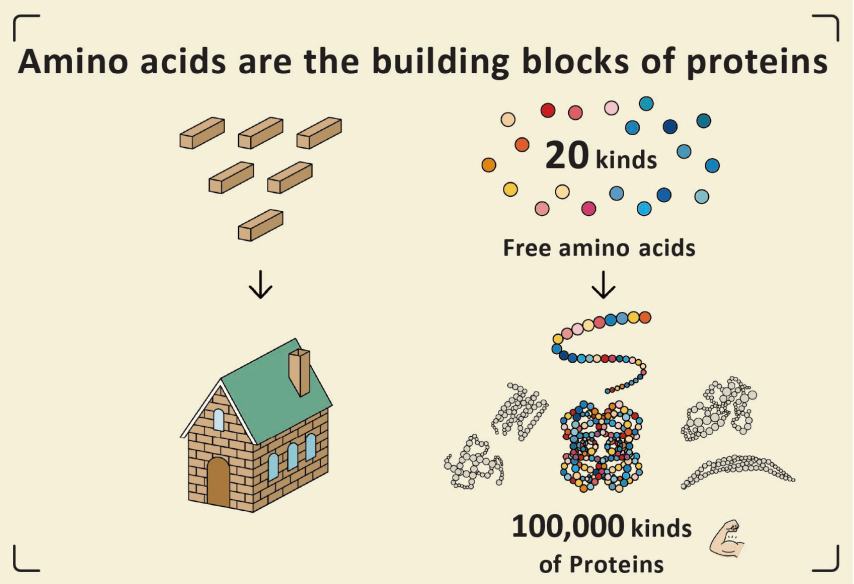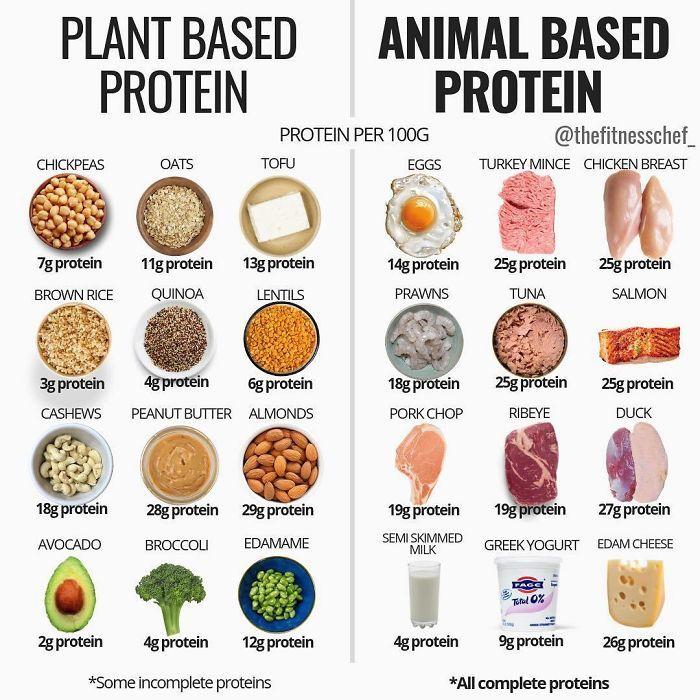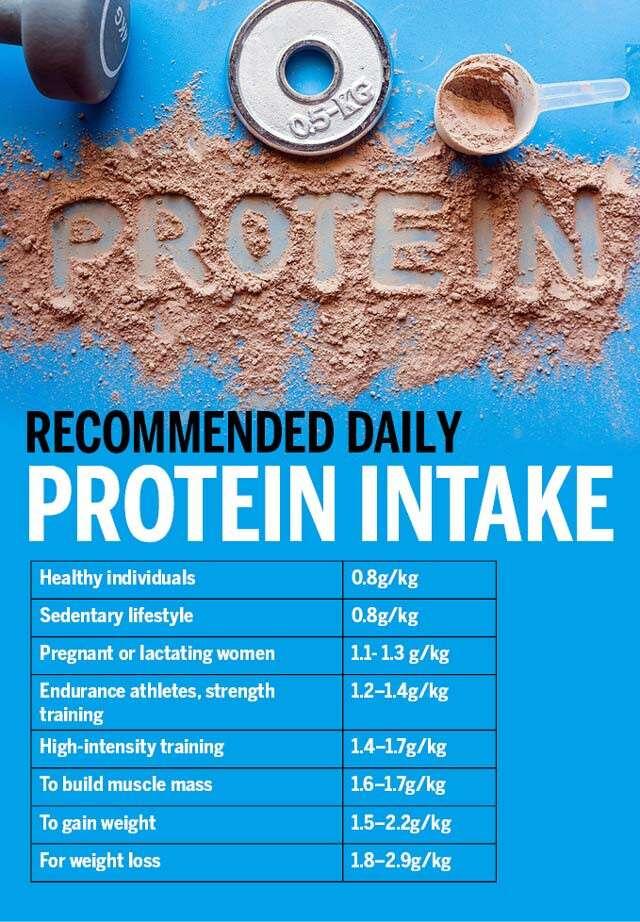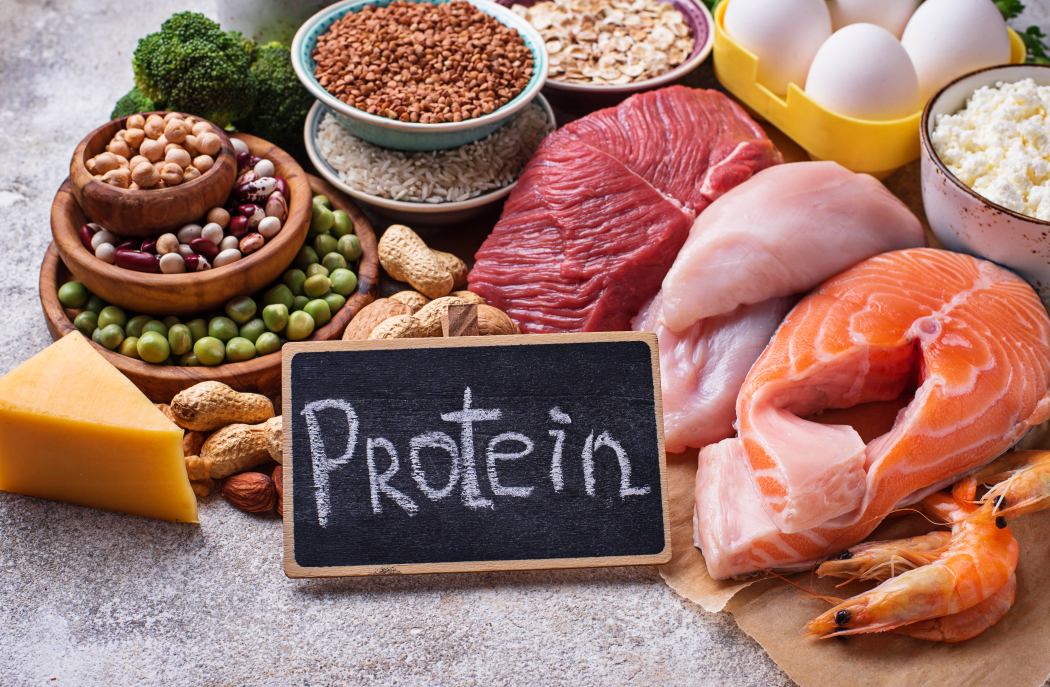Proteins are highly complex substances that are present in all living organisms. Proteins are of great nutritional value. They are directly involved in the chemical processes essential for life. Proteins can be found in foods from both plants and animals. Protein is made up of hundreds or thousands of smaller units, called amino acids, which are linked to one another in long chains. The sequence of amino acids determines each protein’s unique structure and its specific function.
More than 10,000 types of protein are found in everything from your organs to your muscles and tissues to your bones, skin, and hair.
Of the 5 major food groups, protein is a critical part of the processes that fuel energy and carry oxygen in our blood. Moreover, proteins are essential for the creation of antibodies to fight off infections and illnesses and for the health and generation of body cells. The nutritional value of a protein is measured by the number of essential amino acids it contains. Different foods contain different amounts of essential amino acids. Here is the general breakdown:
- Animal products (such as chicken, beef, or fish and dairy products) have all of the essential amino acids and are known as 'complete' protein (or ideal or high-quality protein).
- Soy products, quinoa, and the seed of a leafy green called amaranth (consumed in Asia and the Mediterranean) also have all of the essential amino acids.
- Plant proteins (beans, lentils, nuts, and whole grains) usually lack at least one of the essential amino acids and are considered 'incomplete' proteins.

Benefits of Protein in Food and Nutrition
There is much debate surrounding the health effects of fats and carbohydrates. However, almost everyone agrees that protein is beneficial to human health. Numerous scientific studies suggest that a high-protein diet has major benefits for weight loss and metabolic health.

Controls Appetite and Hunger
Fats, carbohydrates, and proteins are the 3 macronutrients that affect your body in different ways. However, scientific studies have proved that protein is, by far, the most filling. It helps you feel more full, with less food. This is partly because protein reduces the level of ghrelin, the hunger hormone while boosting peptide levels, a hormone that makes you feel full.
Increases Muscle Mass and Strength
Protein is the building block of your muscles. So, it is important to consume sufficient amounts of protein to maintain muscle mass and promote muscle growth.
Strengthens Bones
Most long-term studies indicate that protein, including animal protein, has major benefits for bone health. In other words, people who eat more protein tend to maintain bone mass better as they age and have a much lower risk of osteoporosis and fractures. This is especially important for women.
Boosts Metabolism
Protein has a much higher thermic effect than fat or carbs (20–35% compared to 5–15%). High protein intake boosts metabolism and increases the number of calories you burn. This can amount to 80–100 more calories burned each day, thus aiding weight loss.
Helps in Healthy Aging
Eating more protein is one of the best ways to reduce age-related muscle deterioration and prevent sarcopenia. Sarcopenia is an age-related health disorder that can cause frailty, bone fractures, and reduced quality of life among older adults.
Builds and Regulates Hormones
Protein plays an important role in building certain hormones, such as peptide or protein hormones. Hormonal proteins, like insulin, help with the metabolism of glucose and are highly effective in controlling blood sugar concentrations. Hormones can also activate muscle growth by increasing protein synthesis or decreasing protein breakdown.
Helps the Body to Heal
Protein is directly responsible for the healing of the body from injury. Proteins are crucial in repairing damaged tissues. Collagen synthesis is what helps in healing wounds and repairing tissues. The amino acid, glutamine, acquired through protein intake, stimulates collagen synthesis. When there is a lack of sufficient protein in the body, collagen formation is affected. So, choose high protein foods to give your body a better chance to heal!
Find an amazing dietitian near me to develop a healthy eating plan when you search on Superprof.
How to Choose High Protein Foods
Before you start to amp up the protein quotient in your daily diet, it is imperative to learn how much protein your body needs and from what sources. The best-quality protein is one that includes all the essential amino acids and is bio-available to the human body. Here are our picks for top sources of protein, natural and artificial, for balanced nutrition.
Eggs
Egg protein is highly bio-available. Both the egg white and the yolk help support muscle growth and strength. Eggs are abundant in leucine, one of the most essential amino acids. Try including Omega-3 enriched eggs which contain 6 grams of protein in 1 egg. Contrary to earlier belief, recent studies have confirmed that eggs do not add to the risk of cardiovascular diseases.
Paneer or Cottage Cheese
Around 15 grams in half a cup of paneer is a great way to up your protein. It is especially beneficial as a late-night snack.
Dahi or Yogurt
Yogurt provides around 23 grams of protein per bowl. Dahi also provides the added benefits of gut-friendly bacteria and bone-strengthening calcium.
Milk

Fish and Seafood
This might be a turn-off for vegetarians and vegans. However, fish and seafood are the healthiest foods in the Indian diet. They are rich in Omega-3 fatty acids known as EPA and DHA. The Indian Tilapia is a wonderful brain and muscle food. You can also include sardines, salmon, mussels, shrimps, red-snapper, and oysters for their high protein and mineral content. Shrimps are a source of pure protein. They are low in calories, carbs, and fat. Delicious to taste, shrimps also contain antioxidants like astaxanthin, which reduces inflammation and oxidative damage.
Chicken
Non-vegetarians should opt for organic chicken that is raised naturally. A broth made with chicken bones is a powerhouse of good quality proteins and collagen that help to build and repair your muscles.
Lentils
Lentils need to be combined with rice, wheat, or corn to make it a complete protein with an abundant dose of all essential amino acids. Dal and rice are excellent sources of protein for both vegetarians and non-vegetarians in India. Sprouts are also a great way to obtain easily-absorbable proteins with fiber and B and C vitamins that build immunity.
Red meat
Lean goat or lamb meat is a major source of protein. They are also excellent sources of iron and zinc.
Nuts and seeds
Nuts and seeds, including peanuts, cashews, almonds, walnuts, and seeds like pumpkin, chia, flax, and sunflower, can be a great option for Indian snacks. It is advisable not to heat or roast the seeds as this kills the healthy fatty acids they contain. Also, avoid buying processed and packaged nuts as they are full of sodium.
Green peas
One cup of green peas contains 7.9 grams of protein which is almost the same as a cup of milk.
Amaranth
Amaranth laddoos and other such treats have been a part of the Indian diet for a long time. This native Indian grain is abundant in magnesium, manganese, phosphorus, and iron. It provides 9 grams of protein in a cup of cooked grains.
Soybeans
Soybeans are low in saturated fat and high in vitamin C, protein, and folate. Soy is a great source of calcium, fiber, iron, magnesium, phosphorus, and potassium. One bowl of cooked soybean contains 28 grams of protein.
Legumes
Legumes include varieties of beans such as kidney beans, black beans, chickpeas that are widely considered to be essential sources of proteins. Chickpeas contain about 15 g of protein per serving, along with numerous other nutrients that keep you healthy, strong, and fit. Regular consumption of legumes helps lower cholesterol levels.
Oats
Oats are superfoods that are high in protein and soluble fiber. Consumption of oats has been clinically proven to reduce the risk of heart disease and lower cholesterol. A small cup of oats can provide you with nearly 6 g of protein and a quarter of your daily requirement of fiber. Their high fiber content and low glycemic index enable oats to regulate blood sugar levels.
High Protein Vegetables and Fruits
Some fruits and vegetables have a considerable quantity of protein such as bananas, spinach, potatoes, broccoli, asparagus, and sweet potatoes. The quantity of protein in these fruits and vegetables is of a decent value at around 5 g per cup.
Consult with a dietician in Bangalore or your city (or online!) to create a healthy meal plan.

How Much Protein is Enough?
Find any nutritionist online and they will tell you that few nutrients are as important as protein. However, opinions are divided as to the amounts of protein that you can consume. Most recognized nutritional organizations recommend a fairly modest protein intake.
The recommended dietary allowance (RDA) for protein is 0.8 grams of protein per kilogram of body weight. The RDA is the amount of a nutrient you need to meet your basic nutritional requirements. In other words, the RDA is the minimum amount you need to remain healthy.
For active individuals, the RDA is 10 percent of protein intake out of their total calorie consumption. However, research on optimal protein intake is ongoing. For example, there is ample controversy surrounding the value of high-protein diets for weight loss or cardiovascular health.
Beef, poultry, and pork, as well as milk, cheese, and eggs, are certainly great sources of high-quality protein. But, so are many plant foods, such as whole grains, beans, and other legumes, nuts, and vegetables. Consult with a professional nutritionist to understand what and how much your body requires.
Considering the nutrient "package" (the fats, carbohydrates, vitamins, minerals, and other nutrients that come along with protein) is also critical. Settle on protein sources that are low in saturated fat and processed carbohydrates. Also, logic dictates that if you increase protein intake, you eat less of other things to keep your daily calorie intake steady to maintain nutritional balance.
Learn from an online dietitian to understand healthy diets and how to make your own meal plan.
Summarise with AI:















very helpful .. thank you